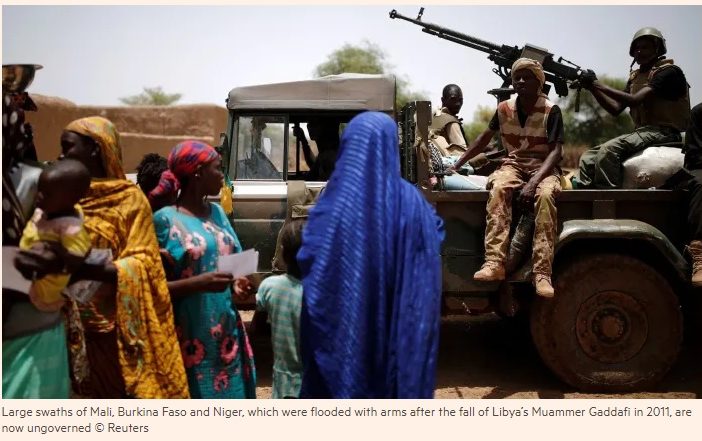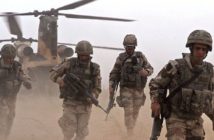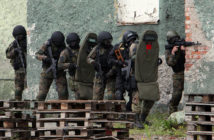ft.com
Neil Munshi in Lagos and Michael Peel in Brussels
Deadly attacks increase fear of terrorism and insecurity in the impoverished region.
A spate of deadly jihadist attacks in west Africa’s Sahel region has highlighted the security breakdown in one of the poorest, least governed parts of the world, and the shortcomings of the western-led response in an area now at the forefront of the global war on terror.
Across the Sahel — a semi-arid zone south of the Sahara including parts of Mali, Burkina Faso and Niger — a combination of porous borders, intercommunal tensions and ill-equipped domestic armies have exacerbated a problem that regional and international forces are now struggling to contain.
The violence has left thousands dead and millions displaced, and surged particularly in Burkina Faso, where dozens of mining workers were killed by gunmen on November 6. “I think people are realising the failure of the strategy that has been used so far to fight violent extremism,” said Mathias Hounkpe, head of the Mali country office for the Open Society Initiative for west Africa.
Mr Hounkpe pointed to a tour of the region last week by Florence Parly, defence minister of France, as one sign that the world was beginning to recognise the extent of the problem. “The message coming out is clearly that they are looking for alternate strategies,” he said, noting that both Mali and Burkina Faso have seen protests against what some see as their government’s failure to control the violence and the ineffectiveness of western involvement.
This month Ibrahim Boubacar Keïta, Mali’s president, warned in a television address: “The stability and existence of our country are at stake.” France was the former colonial power in most of the Sahel and has led international response efforts. Ms Parly’s trip was aimed at reassuring Mali of European support and bolstering France’s appeal to EU partners that they should increase military training in the region after jihadis killed about 50 Malian soldiers at the start of November. “Against terrorism, there is no lightning operation, no decisive blow to stop their destructive folly and their ideology,” Ms Parly told security forces in Gao, Mali. “There is only patience, determination and persistence that will allow us to win this long-term struggle.” Since 2012, when France intervened to crush an Islamist insurgency in northern Mali, al-Qaeda and Isis-linked groups have fought back, working with ethnic militias to exploit communal tensions and undermine government authority.
Large swaths of the landlocked countries, which were flooded with arms after the fall of Libya’s Muammer Gaddafi in 2011, are now ungoverned. The proximity of the Sahel to Europe and the twin issues of migration and terrorism make the region a key area of concern in European capitals. “We are very worried about developments in the Sahel,” said a senior EU official in Brussels, where the region will be discussed this month at a meeting of foreign ministers. “The [insecurity] is . . . spreading [and] we expect the problem to get worse.” Despite the continued French presence — 4,500 troops, drones and fighter jets operating across a territory the size of Europe — terror attacks in Burkina Faso tripled last year to 150, according to the US state department. © Reuters France is supported by special forces and intelligence gathering from the US and other European countries, in addition to a 12,000-strong UN peacekeeping force in Mali, but the threat has continued to increase, even seeping into neighbouring Ivory Coast and Benin.
The metastasising violence has raised fears among European and US allies that the Sahel will become the next haven for fighters returning from Iraq and Syria, particularly after the killing last month of Isis leader Abu Bakr al-Baghdadi. “Terrorist fighters are always looking for the next battleground,” Nathan Sales, the US state department’s top counterterror official, said earlier this month. New initiatives are under way to combat the threat. West African countries in September pledged $1bn to the underfunded G5 Sahel force which has struggled since it was formed by Mali, Burkina Faso, Chad, Mauritania and Niger five years ago.
The Sahel Alliance — which was launched in 2017 by France, Germany and the EU and has since expanded to include other European countries, the World Bank, the African Development Bank and the UN Development Programme — said in September that it had €11.6bn at its disposal. It has earmarked 800 development projects to be implemented in the G5 Sahel countries over the next five years. Europe is focused on promoting “the extension of governance in the region, which is key to ensuring stability”, said one EU member state diplomat. But there are concerns over how greater involvement can be financed and sustained. “The ambition is shared to do more and do it in a better way,” the diplomat said. “The question is how will it be resourced.”
Arthur Boutellis, senior adviser at the International Peace Institute, said a focus on governance is appropriate, with the military approach showing little progress. “Unless you address the governance and root causes of why these groups are able to succeed . . . you can have as many military targeted assassinations as you want, [but] you will not address the issue,” he said. Additional reporting by Victor Mallet







